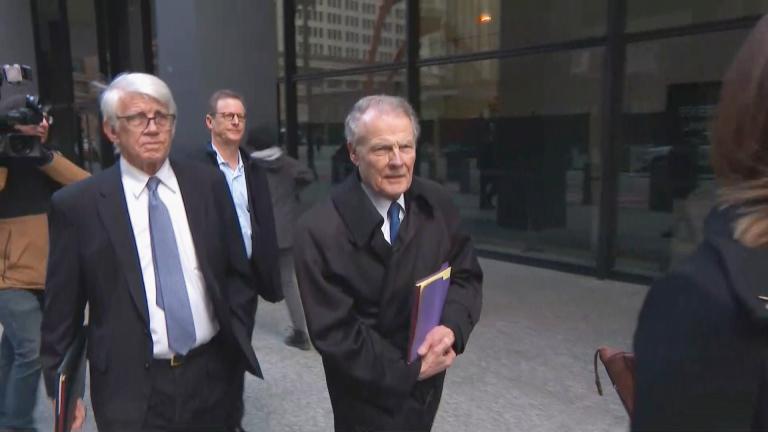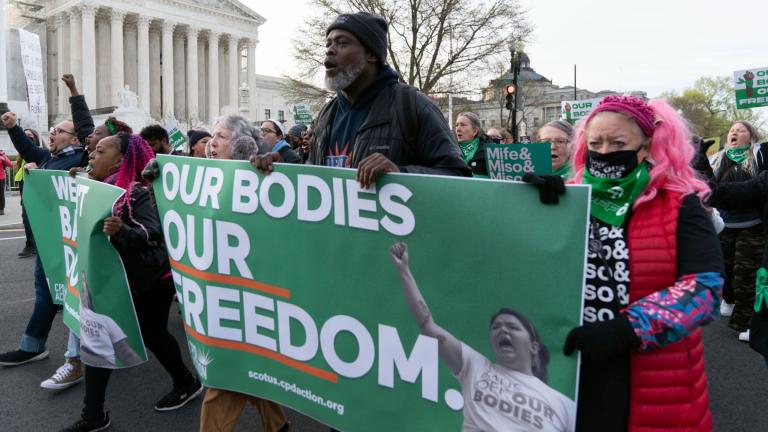Public employee unions nationwide will face a reckoning given the U.S. Supreme Court’s decision Wednesday morning on Janus v. AFSCME, a case with Illinois roots. The ruling hands Republican Gov. Bruce Rauner and his party a victory that could mark a turning point in modern political dynamics.
In a 5-4 decision, the court’s conservative justices ruled that states cannot require public workers to pay union “fair-share” fees, which are separate and apart from union member dues.
Without that requirement, unions representing teachers, municipal workers – including police and fire fighters – and state government employees could see an exodus. That in turn would strip the labor movement of the political heft it typically uses to bolster Democratic candidates, giving Republican and corporate causes the upper hand in political organizing.
Understanding labor lexicon is key to the case: Dues are intended to cover all union activities, including political activism. “Fair-share” fees are intended to cover union organizers’ work securing a collective bargaining agreement for all employees (whether members of the union or not), such as wage, health care and other benefits.
Mark Janus, a child care specialist with the Illinois Department of Healthcare and Family Services who lives in Springfield, had argued his right to free speech was violated by having to pay a fair-share fee to the American Federation of State, County and Municipal Employees Council 31.
“The First Amendment is violated when money is taken from nonconsenting employees for a public-sector union; employees must choose to support the union before anything is taken from them. Accordingly, neither an agency fee nor any other form of payment to a public-sector union may be deducted from an employee, nor may any other attempt be made to collect such a payment, unless the employee affirmatively consents to pay,” Justice Samuel Alito wrote in the majority opinion.
By midday Wednesday, the Rauner administration had sent a notice to the state government workforce saying that Illinois will stop deducting “fair share” fees from non-union members’ paychecks immediately.
The email from acting Central Management Services Director Tim McDevitt explains that “a bargaining unit employee can opt-in or opt-out of a union at any time.”
According to McDevitt’s letter, it costs a state employee on average $911 a year to be a fully fledged member of a union. Those who only pay “fair-share” fees pay approximately $174 less, or about $737 a year.
With the Janus decision, employees will no longer be obligated to pay anything. They can opt out of both full union membership and the fair share fee.
Per federal law, unions will still have to represent all employees who would be eligible to join their ranks.
“The Supreme Court’s decision does not alleviate unions of their obligations to fairly represent all bargaining unit employees in collective bargaining,” McDevitt wrote in the notice to workers. “An employee’s decision to join or withdraw from the union will not impact his or her job protections with the state.”
Already, conservative groups like the Illinois Policy Institute, which is a partner of the Liberty Justice Center that banked Janus’s legal case, are actively seeking to persuade members to withdraw from union representation, with websites like leavemyunion.com.
“This case is a blatant political attack by Bruce Rauner and other wealthy interests on the freedom of working people to form strong unions,” AFSCME Council 31 Executive Director Roberta Lynch said in a statement. “We are extremely disappointed the Supreme Court has taken the side of the powerful few, but we’re more determined than ever to keep our union strong, standing up for public services and the working people who provide them.”
Critics say those who leave the union, but still enjoy the benefits unions secure for workers, are free riders—essentially eating the pie but leaving it to their colleagues to pay the bill.
A study published this spring by the Illinois Economic Policy Institute found that overturning 41 years of case law in Janus’s favor would in time lead to steep declines in union membership in the 22 remaining non right-to-work states, like Illinois, and that weakened unions mean public workers will earn lower wages.
Analysts with the credit union Moody’s issued a statement saying that “these developments could change how state and local governments set employee wages and pensions, resulting in a positive long-term impact on government finances.”
Rauner had tried to wipe out fair-share fees from his nascent days as governor. He was prevented from formally being part of the case because lower courts found he lacked standing as a plaintiff, but the Janus decision is sure to be a hallmark of his legacy as governor.
The Supreme Court decision will give Illinois state employees the option of dropping their financial support for unions. But Rauner’s ongoing battle with labor, combined with public employees’ fears left from the 2015-2017 budget impasse, has galvanized the labor movement, and may instead propel once-wary union members to reaffirm their commitment to the cause.
Follow Amanda Vinicky on Twitter: @AmandaVinicky
Related stories:
A Look at the Biggest US Supreme Court Decisions as Term Nears End
Landmark Supreme Court Decision Coming, And Illinois is Center Stage
Illinois Case Could Deal Major Blow to Public Sector Unions
From Gerrymandering to Gay Rights, Supreme Court Faces ‘Blockbuster’ Term
US Supreme Court to Take on Union Fees Case Janus v AFSCME








